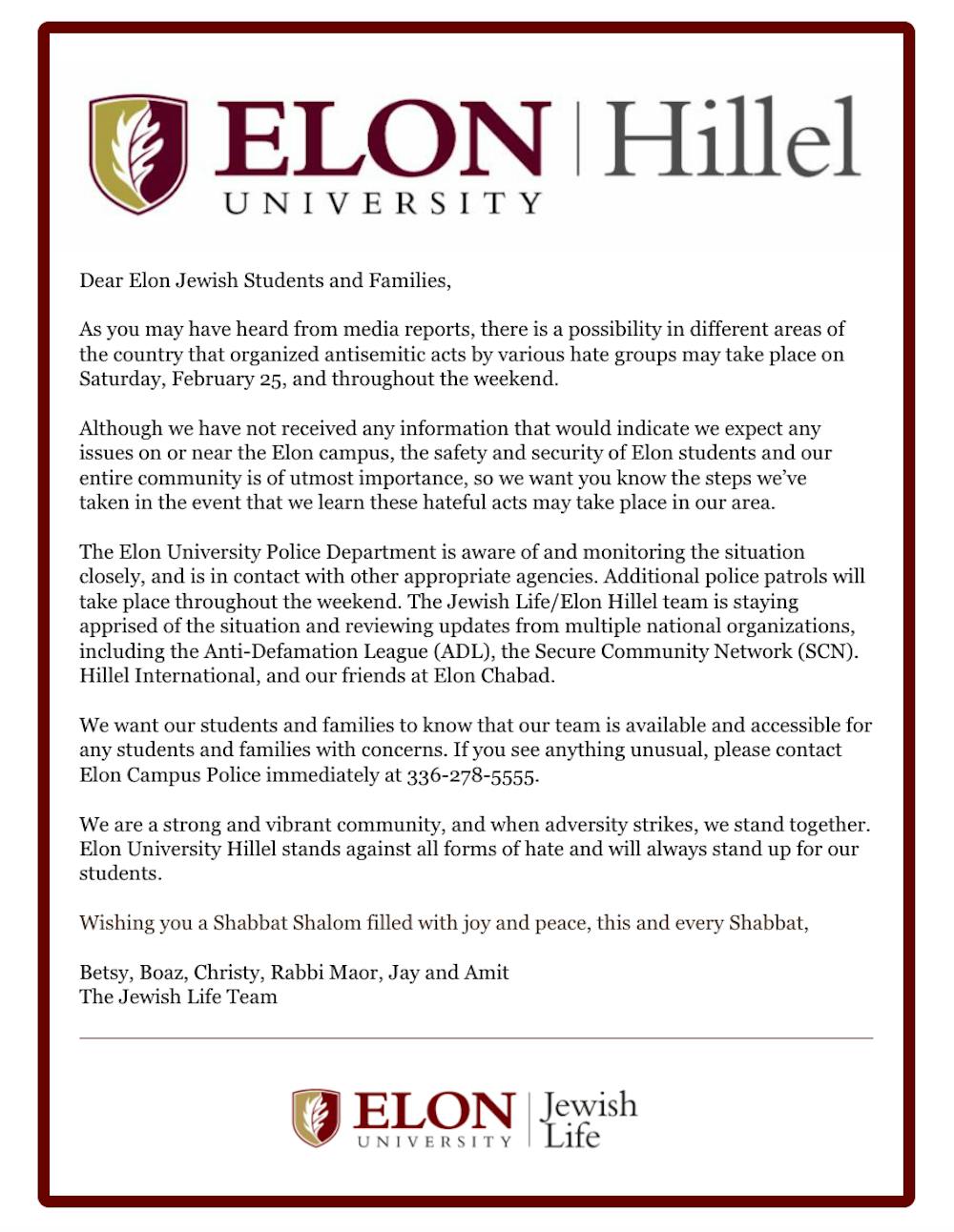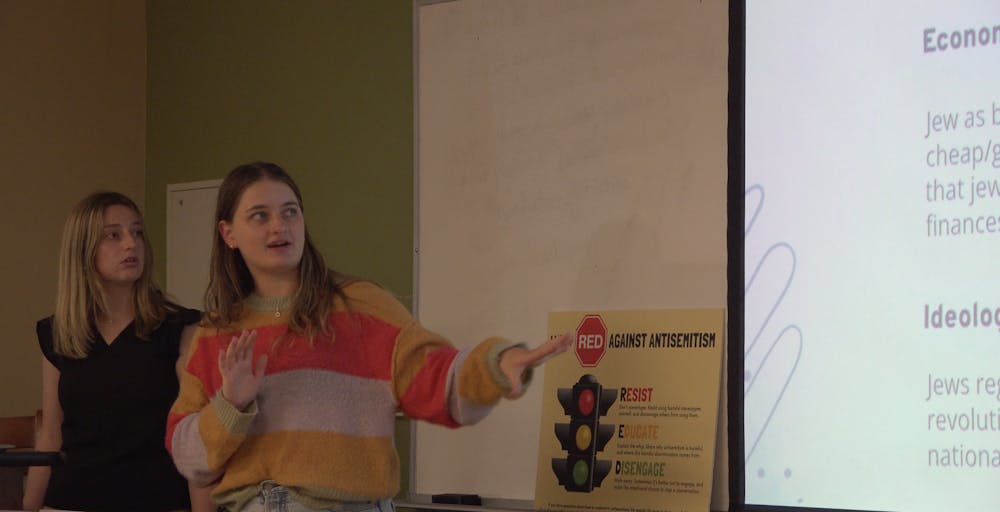Junior Mandi Lichtenstein stood in front of Elon University’s Hillel discussing ways to increase antisemitism awareness. Lichtenstein, who serves as the vice president of Israel education of Hillel, had the goal of making sure the local community was educated about ways to respond to antisemitism.
The discussion was held at the Antisemitism Awareness Training by Elon Hillel, March 23. Lichtenstein, along with senior Corinne Brager, led the session through reviewing history about antisemitism and acknowledging counter strategies about the topic.
“It's important that both Jewish and non-Jewish students know what antisemitism is, what the forms of Jewish hate are and to know how to protect their friends and themselves,” Lichtenstein said. “It's a very sneaky form of hate.”
Antisemitism is a form of prejudice and hatred against Jewish people. The purpose of the training was to inform students, faculty and staff about the history of antisemitism along with how to address antisemitic situations.
According to the U.S. Holocaust Memorial Museum, antisemitism dates back thousands of years and Jewish discrimination did not end with the Holocaust.The historical event still has a large effect on society today and recent events have had a major impact on Jewish communities everywhere as they live with a watchful eye.
According to the Audit of Antisemitic Incidents in 2022, the Anti Defamation League — an international Jewish organization— these 3,697 antisemitic incidents throughout the U.S. This is a 36% increase from the 2,717 incidents tabulated in 2021 and the highest number on record since ADL began tracking antisemitic incidents in 1979. There was also a sudden rise in antisemitic events in 2017.
On Feb. 24 Hillel at Elon University sent an email to Jewish students and families as a preliminary caution of recent organized antisemitic events.

A copy of an email from Hillel at Elon University that went out to Jewish-identifying students on campus Feb. 24, warning them of the possible occurrence of antisemitic acts, organized by various hate groups, across the country.
The 2022-23 Multifaith Strategic Planning Committee Report works to make a more diverse campus experience overall, especially in the classroom, and articulates the value and importance of multi faith learning as well as diversity, equity and inclusion education for the entire community. Through new research opportunities and enhanced curricular elements, the committee plans to foster more of a multifaith learning environment.
Lichtenstein, who has been in antisemitic situations before, said she feels it is hard to express her own experiences because she feels others may not relate to her. This training allowed attendees to open up and share their thoughts about their experiences.
“As someone who's gone through antisemitic incidents myself, it's really hard to talk about because you feel like nobody else understands,” Lichtenstein said.
Similarly, Brager, who formerly served as the community development chair at Hillel, said she has experienced antisemitic comments and was unsure how to feel. She said going to her advisor has been a good outlet to express her concerns.
“When I’ve experienced any sort of antisemitism, what has really changed the game for me was knowing that I went to that advisor and I said, ‘You know, this really upset me. I’m not sure if it was antisemitic, but I’m really upset,’” Brager said. “They said, ‘It doesn't matter what the other person said to be antisemitic, you are feeling this way and that’s valid.’”
Brager said that discussing concerns and incidents can help those who may have experienced upsetting situations and know that their feelings are valued.
Freshman Michaela Shapiro said she feels that it’s important for her to be educated on antisemitism and its background, especially for being a Jewish student on campus. Being knowledgeable is important when she needs to address the words and actions of others.
“It's good to be aware of this topic and to support the Jewish community on this campus,” Shapiro said. “I'm also an RA, so it's good, personally for me, because it raises my awareness. If I hear the students saying something I can talk to them and educate them on why you can't say this or why this is bad.”
Antisemitism and microaggressions can be made anywhere — even on college campuses. Director of Jewish Law at Elon Betsy Polk said that when any incident occurs, it affects the entire community.
“It's not just about antisemitism — antisemitism lives with racism, with nationalism and with all the ‘isms,’” Polk said. “They all feed off each other. So when one happens, the others happen too and this affects all of us.”
Events like the antisemitism awareness training are available to the Elon community. There are also other resources the community can utilize for support, such as talking to counseling services. For students in need of support, Lichtenstein also created a survey that allows those who experience any form of hate to submit an anonymous report.
Brager also acknowledges the importance of speaking up. She said that being in an understanding community can encourage people to take action.
“It's really hard to respond to any sort of hate or microaggressions when they're happening because you feel so in shock at that moment,” Brager said. “Providing, on our campus, a safe space when it comes to reporting … allows students that when they come to you, they feel supported.”
Lichtenstein hopes that this training was also a reminder to the Elon community about the importance of supporting all groups on campus, regardless of their beliefs.
“A lot of us will post for Black Lives Matter, or for LGBTQ rights, and for all kinds of other progressive movements, but then our friends don't post for us when we're going through a time where antisemitism is on the rise,” Lichtenstein said. “It can be hard to deal with that, despite having such a large Jewish community on this campus.”
Other forms of outreach:
Truitt Center: 336-278-7729
Hillel: 336-278-7367
Elon Counseling: 336-278-7280


